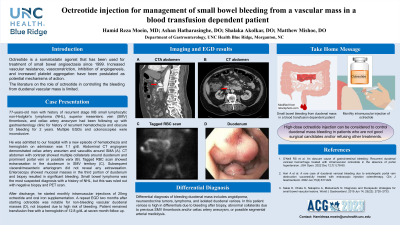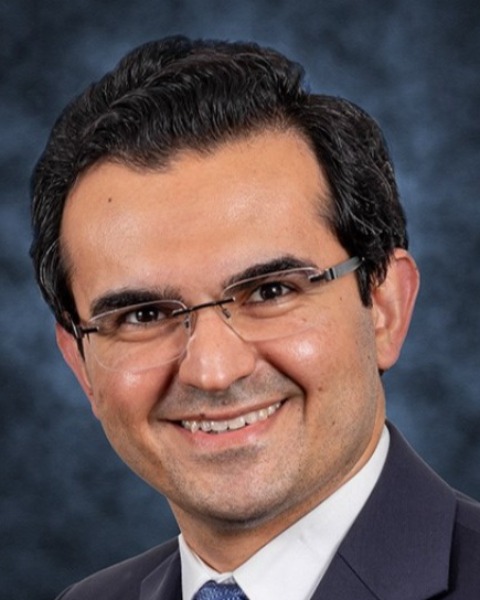Sunday Poster Session
Category: GI Bleeding
P0646 - Octreotide Injection for Management of Small Bowel Bleeding From a Vascular Mass in a Blood Transfusion Dependent Patient
Sunday, October 22, 2023
3:30 PM - 7:00 PM PT
Location: Exhibit Hall

Has Audio

Hamid Reza Moein, MD
UNC Health Blue Ridge
Morganton, North Carolina
Presenting Author(s)
Hamid Reza Moein, MD, Ashan Hatharasinghe, DO, Shalaka Akolkar, DO, Matthew Mishoe, DO
UNC Health Blue Ridge, Morganton, NC
Introduction: Octreotide is a somatostatin agonist that has been used for treatment of small bowel angioectasia since 1999. Increased vascular resistance, vasoconstriction, inhibition of angiogenesis, and increased platelet aggregation have been postulated as potential mechanisms of action. The literature on the role of octreotide in controlling the bleeding from duodenal vascular mass is limited.
Case Description/Methods: 77-years-old man with history of recurrent stage IIIB small lymphocytic non-Hodgkin's lymphoma (NHL), superior mesenteric vein (SMV) thrombosis, and celiac artery aneurysm had been following up with gastroenterology clinic for history of recurrent hematochezia and obscure GI bleeding for 2 years. He had been receiving at least monthly blood transfusions. His hemoglobin levels were as low as 5.4 g/dl, iron level < 10 ug/dl and ferritin13 ng/ml, and he was noncompliant with iron supplements. Multiple EGDs and colonoscopies were inconclusive. He was admitted to our hospital with a new episode of hematochezia and hemoglobin on admission was 7.1 g/dl. Abdominal CT with contrast was unrevealing and demonstrated celiac artery aneurism and multiple collaterals around duodenum. Tagged RBC scan showed extravasation in the duodenum in SMV territory. Subsequent visceral/mesenteric arteriogram did not reveal any extravasation. Enteroscopy showed mucosal masses in the third and fourth portions of duodenum and biopsy resulted in significant bleeding. With the history of NHL, small bowel lymphoma was the most suspected diagnosis, but negative biopsy and negative PET scan ruled it out. After discharge, he started monthly intramuscular injections of 20mg octreotide and also oral iron supplementation. A repeat EGD two months after starting octreotide was notable for non-bleeding vascular duodenal masses, and these were not biopsied due to high risk of bleeding. Patient remained transfusion free with a hemoglobin of 12.8 g/dL at seven month follow up. He refused further work-up.
Discussion: Differential diagnosis of bleeding duodenal mass includes angiolipoma, neuroendocrine tumors, lymphoma, and isolated duodenal varices (in this patient possibly due to abnormal collaterals due to previous SMV thrombosis and/or celiac artery aneurysm). This case highlights the difficulty of finding the source of small bowel bleeding. High-dose octreotide injection can be used to control duodenal mass bleeding in patients who are not good surgical candidates and/or refusing other treatments.
Disclosures:
Hamid Reza Moein, MD, Ashan Hatharasinghe, DO, Shalaka Akolkar, DO, Matthew Mishoe, DO. P0646 - Octreotide Injection for Management of Small Bowel Bleeding From a Vascular Mass in a Blood Transfusion Dependent Patient, ACG 2023 Annual Scientific Meeting Abstracts. Vancouver, BC, Canada: American College of Gastroenterology.
UNC Health Blue Ridge, Morganton, NC
Introduction: Octreotide is a somatostatin agonist that has been used for treatment of small bowel angioectasia since 1999. Increased vascular resistance, vasoconstriction, inhibition of angiogenesis, and increased platelet aggregation have been postulated as potential mechanisms of action. The literature on the role of octreotide in controlling the bleeding from duodenal vascular mass is limited.
Case Description/Methods: 77-years-old man with history of recurrent stage IIIB small lymphocytic non-Hodgkin's lymphoma (NHL), superior mesenteric vein (SMV) thrombosis, and celiac artery aneurysm had been following up with gastroenterology clinic for history of recurrent hematochezia and obscure GI bleeding for 2 years. He had been receiving at least monthly blood transfusions. His hemoglobin levels were as low as 5.4 g/dl, iron level < 10 ug/dl and ferritin13 ng/ml, and he was noncompliant with iron supplements. Multiple EGDs and colonoscopies were inconclusive. He was admitted to our hospital with a new episode of hematochezia and hemoglobin on admission was 7.1 g/dl. Abdominal CT with contrast was unrevealing and demonstrated celiac artery aneurism and multiple collaterals around duodenum. Tagged RBC scan showed extravasation in the duodenum in SMV territory. Subsequent visceral/mesenteric arteriogram did not reveal any extravasation. Enteroscopy showed mucosal masses in the third and fourth portions of duodenum and biopsy resulted in significant bleeding. With the history of NHL, small bowel lymphoma was the most suspected diagnosis, but negative biopsy and negative PET scan ruled it out. After discharge, he started monthly intramuscular injections of 20mg octreotide and also oral iron supplementation. A repeat EGD two months after starting octreotide was notable for non-bleeding vascular duodenal masses, and these were not biopsied due to high risk of bleeding. Patient remained transfusion free with a hemoglobin of 12.8 g/dL at seven month follow up. He refused further work-up.
Discussion: Differential diagnosis of bleeding duodenal mass includes angiolipoma, neuroendocrine tumors, lymphoma, and isolated duodenal varices (in this patient possibly due to abnormal collaterals due to previous SMV thrombosis and/or celiac artery aneurysm). This case highlights the difficulty of finding the source of small bowel bleeding. High-dose octreotide injection can be used to control duodenal mass bleeding in patients who are not good surgical candidates and/or refusing other treatments.
Disclosures:
Hamid Reza Moein indicated no relevant financial relationships.
Ashan Hatharasinghe indicated no relevant financial relationships.
Shalaka Akolkar indicated no relevant financial relationships.
Matthew Mishoe indicated no relevant financial relationships.
Hamid Reza Moein, MD, Ashan Hatharasinghe, DO, Shalaka Akolkar, DO, Matthew Mishoe, DO. P0646 - Octreotide Injection for Management of Small Bowel Bleeding From a Vascular Mass in a Blood Transfusion Dependent Patient, ACG 2023 Annual Scientific Meeting Abstracts. Vancouver, BC, Canada: American College of Gastroenterology.
